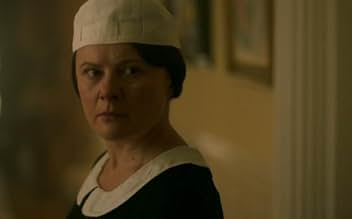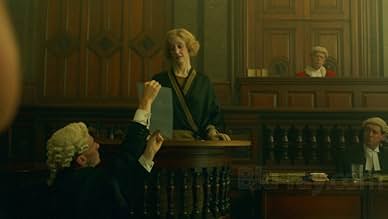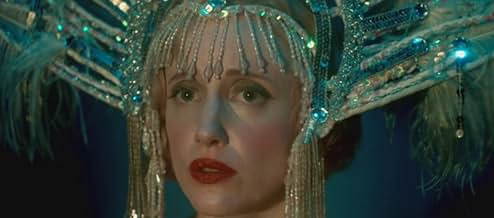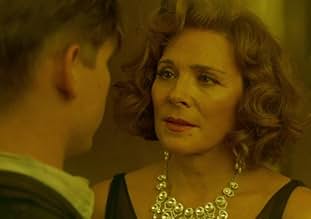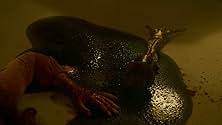Témoin à charge
Titre original : The Witness for the Prosecution
NOTE IMDb
7,0/10
6 k
MA NOTE
Emily French, une femme très riche, est retrouvée assassinée à son domicile. Léonard, un jeune homme avec lequel elle entretenait une relation, est immédiatement suspecté.Emily French, une femme très riche, est retrouvée assassinée à son domicile. Léonard, un jeune homme avec lequel elle entretenait une relation, est immédiatement suspecté.Emily French, une femme très riche, est retrouvée assassinée à son domicile. Léonard, un jeune homme avec lequel elle entretenait une relation, est immédiatement suspecté.
- Nomination aux 1 BAFTA Award
- 2 victoires et 6 nominations au total
Parcourir les épisodes
Avis à la une
The Charles Laughton/Tyrone Powers/Marlene Dietrich/Billy Wilder 1957 film of "Witness for the Prosecution" has been one of my favorite films since I was in high school. So, watching this Toby Jones version--that follows Agatha Christie's original short story--comes as quite a surprise. Mostly the same characters, but with a decidedly different take on the story of love & guilt. The two "Witness" films are like watching the Kurosawa film "Rashomon"--the guilt lands on different characters.
That said, and because I'm a student of film, I liked the Toby Jones version, too; and don't feel like it's inferior to the Billy Wilder film. The photography and set designs are all shadows, fog and smoke; just the right mood for a story that is does not reveal itself and fools the eyes. The acting is all excellent, which is in keeping with all British productions. And, the pacing of the narrative is accomplished with no tech or CGI--which is refreshing in this age of SuperHero films.
Bottom line: if approached without bias, this film of Agatha Christie's "first draft" of Witness for the Prosecution is rewarding on it's on merits.
That said, and because I'm a student of film, I liked the Toby Jones version, too; and don't feel like it's inferior to the Billy Wilder film. The photography and set designs are all shadows, fog and smoke; just the right mood for a story that is does not reveal itself and fools the eyes. The acting is all excellent, which is in keeping with all British productions. And, the pacing of the narrative is accomplished with no tech or CGI--which is refreshing in this age of SuperHero films.
Bottom line: if approached without bias, this film of Agatha Christie's "first draft" of Witness for the Prosecution is rewarding on it's on merits.
This is one of those productions that combine really interesting characters within a story that has enough twists and turns to hold your interest, despite its rather tenuous link to real life events. What really drives this show along are the period details, the 'mood' and feel of the thing, and the solid acting by almost everyone involved. I felt 'Leonard' was the least effective character and the actor wasn't that convincing either. But Toby Jones and Ms Riseborough were too-notch in their performances. The pace was slow, filled with tension and showed how the various stratas of society dealt with the aftermath of a devastating war. The psychological damage was the most obvious, resulting in murder and an almost carefree attitude about the whole process and planning of it. This is a short story that is probably one of Ms. Christie's most damning condemnations of war and although adapted by Sarah Phelps, has definitely stayed true to the original intent. It's not light entertainment but worth watching, despite the fact that the lighting was just a bit too obvious in trying to create a certain 'atmosphere'.
I suppose it's a question of taste, and some people may find the BBC adaptations more realistic than the ITV Poirot & Marple adaptations, but I'm afraid both this and last year's "And Then There Were None" just leave me thoroughly depressed.
While both have been well-acted and well-directed, there seems to be an insistence on making things as bleak, miserable and depressing as follows, from the coughing-fit sex scene to the muted colours with no really likable characters at all.
Perhaps it is wrong to expect stories of murder to be fun. And maybe shows like "Midsomer Murders" cater for the likes of me.
I just find it irritating that in order to gain critical respectability, the BBC feels a need to pour a thick layer of dismal over their Christie adaptations. As excellent an actor as Toby Jones is, I found myself longing for Charles Laughton's bombast and energy.
And yes, I must admit, I miss the flashy, cartoony ITV Marple series. What a shame the BBC now has the rights to those stories too.
While both have been well-acted and well-directed, there seems to be an insistence on making things as bleak, miserable and depressing as follows, from the coughing-fit sex scene to the muted colours with no really likable characters at all.
Perhaps it is wrong to expect stories of murder to be fun. And maybe shows like "Midsomer Murders" cater for the likes of me.
I just find it irritating that in order to gain critical respectability, the BBC feels a need to pour a thick layer of dismal over their Christie adaptations. As excellent an actor as Toby Jones is, I found myself longing for Charles Laughton's bombast and energy.
And yes, I must admit, I miss the flashy, cartoony ITV Marple series. What a shame the BBC now has the rights to those stories too.
The work of Agatha Christie is amazingly addictive! Regardless of how many times you read the original novel/short story, or how many different screen adaptations you already watched, you will always still look forward to the next big film or TV version! That's the case for me, at least, I'm sorry if I tend to generalize! But, seriously, the woman was brilliant, and the good people at the BBC seem to share this opinion, since they produced a few nicely sophisticated, well-budgeted and glamourous mini-series of Mrs. Christie's most famous and legendary stories lately. I, for one, am truly grateful they did, because I can only applaud that the work of my favorite writer of all times continues to reach wider and younger generations of audiences! "Witness for the Prosecution" was originally a short story and a stage play, and it hasn't been turned into film versions as often as, say, "Murder on the Orient Express" or "And then there were None". Of course, there's the phenomenal Billy Wilder classic from 1957. More than sixty years old, but that film still stands as one of the greatest and most influential courtroom dramas/thrillers in history, with intimidatingly bombastic courthouse settings and fascinatingly eccentric lead characters. A very praiseworthy innovation in this BBC version is the complete altering of the personas of the pivot characters, and it works perfectly. Mayhew, as depicted by the great Charles Laughton in 1957, was a self-confident and charismatic barrister, whereas Tobey Jones puts him down as timid, humble, sickly and highly insecure counsellor. Romaine Heilger, once portrayed by Marlene Dietrich as a cold and heartless shrew, is here a sensitive and introvert young lady. But, as to be expected in the universe of Agatha Christie, perhaps nothing and nobody is what they seem.
Kim Catrall has a splendid supportive role as Emily French; a lewd and eccentric heiress who likes to toy around with men that are much younger than her. She falls for the handsome Leonard Vole, and even changes her entire will in favor of him. When Emily is found brutally murdered at her home, the jealous and possessive maid Janet is quick to accuse Vole, and admittedly all the evidence does point in his direction. Barrister John Mayhew, struggling with his health as well as with his own guilt, believes in Vole's innocence and centers his defense around the testimony of his wife Romaine who can confirm Leonard was at home at the time of the murder. But then the loving wife suddenly and unexpectedly turns against Leonard. "The Witness for the Prosecution" wondrously recreates the 1920s and the depressing post-WWI era. BBC writer Sarah Phelps turned the short story into a totally different version than the 1957 classic, but it's an equally hypnotizing thriller with great performances, decors and photography.
Kim Catrall has a splendid supportive role as Emily French; a lewd and eccentric heiress who likes to toy around with men that are much younger than her. She falls for the handsome Leonard Vole, and even changes her entire will in favor of him. When Emily is found brutally murdered at her home, the jealous and possessive maid Janet is quick to accuse Vole, and admittedly all the evidence does point in his direction. Barrister John Mayhew, struggling with his health as well as with his own guilt, believes in Vole's innocence and centers his defense around the testimony of his wife Romaine who can confirm Leonard was at home at the time of the murder. But then the loving wife suddenly and unexpectedly turns against Leonard. "The Witness for the Prosecution" wondrously recreates the 1920s and the depressing post-WWI era. BBC writer Sarah Phelps turned the short story into a totally different version than the 1957 classic, but it's an equally hypnotizing thriller with great performances, decors and photography.
Good movie, even better than another old one of the same name.
Of course, any Agatha Christie film will make the viewer walk side by side with the investigator for some crime that will occur.
And this little jewel is no different.
Arches of the well-built characters, villains shifting positions with good guys, beautiful environments and frames.
Anyway, all the instruments needed for good fun.
Enjoy!!
Le saviez-vous
- AnecdotesThis is the first production of "Witness for the Prosecution" that is based on Agatha Christie's original short (23 pages) story first published in the January 31, 1925 edition of Flynn's Weekly under the title 'Traitor Hands'. She republished it in 1933 under the present title as part of a collection called 'The Hound of Death and other stories'. Christie expanded the story for her 1953 play, changing some of the character names and introducing Sir Wilfrid Robarts as the defense counsel. It is the play, not the short story, that has been the basis for all subsequent television and film versions.
- GaffesThroughout the film they are addressing the judge as "your honour". That's American. In England a male judge is addressed to as "My Lord". Also Americanisms, Janet is hanged with an American-style coiled noose, not the simple eyelet noose used in Britain, and the hood put on her is black (as in America) not white (as in Britain).
- Versions alternativesEdited into a single, two hour film for its US home video and streaming release.
- ConnexionsVersion of Witness for the Prosecution (1949)
Meilleurs choix
Connectez-vous pour évaluer et suivre la liste de favoris afin de recevoir des recommandations personnalisées
- How many seasons does The Witness for the Prosecution have?Alimenté par Alexa
Détails
- Date de sortie
- Pays d’origine
- Site officiel
- Langues
- Aussi connu sous le nom de
- The Witness for the Prosecution
- Lieux de tournage
- Sociétés de production
- Voir plus de crédits d'entreprise sur IMDbPro
Contribuer à cette page
Suggérer une modification ou ajouter du contenu manquant



